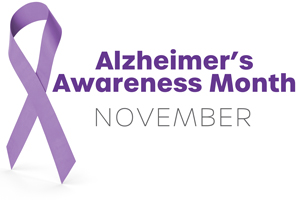
Transforming Rural Health
Montana's Five-Year Vision

Montana’s rural communities will soon see major changes in health care with a $233 million federal grant to stabilize and modernize rural health care delivery throughout the state.
This investment reflects the first-year award of a five-year grant program, with Montana currently set to receive up to $1.2 billion over the life of the program. Secured through the Centers for Medicare & Medicaid Services (CMS) Rural Health Transformation Program (RHTP), these funds will ensure long-term, high-quality care for the state’s rural communities.
“With this unprecedented funding, we are taking a major step toward modernizing Montana’s rural health care systems,” Gov. Gianforte said. “We’re launching this program and making a long-term commitment to our rural communities by providing Montana families with the access to health care they deserve.”
The announcement follows the successful approval of Montana’s application to CMS, which DPHHS submitted in November. The state received the fourth-highest funding award among all 50 states, signaling the quality and strength of Montana’s application.
Established by the 2025 Working Families Tax Cuts Act, the RHTP provides up to $50 billion nationally through 2030 to help states stabilize, transform, and restructure rural health systems and support essential health care providers with sustainability.
“Every Montanan deserves top-level health care, no matter where they live,” Dir. Brereton said. “This landmark funding provides the resources we need to execute our plan, which includes stabilizing our most rural hospitals and bridging the health care divide for families living in every corner of our state.”
DPHHS will now submit a revised budget to CMS that aligns with the award, in addition to partnering with the Montana Office of Rural Health to host biannual stakeholder meetings, ensuring ongoing input from the public. The first meeting will be Thursday, January 22.
During the seven-week application development period, DPHHS prioritized sustainable, transformative initiatives designed to be sustained beyond RHTP funding. As the Department transitions to implementation, it will establish a dedicated internal unit to administer the five-year program and select external implementation partners through competitive procurement processes.
DPHHS will collaborate with rural providers, hospitals, community organizations, and other health care stakeholders to deliver five core initiatives tailored to Montana’s rural health care challenges.
Core Initiatives
Five core initiatives make up Montana's rural transformation plan:
WORKFORCE DEVELOPMENT: Increasing recruitment, expanding clinical training, and retaining rural health care providers in partnership with the Montana Department of Labor and Industry.
SUSTAINABLE ACCESS: Stabilizing rural facility finances through restructuring recommendations and expanded telehealth services, including one-time awards for necessary telehealth equipment.
INNOVATIVE CARE MODELS: Expanding value-based payment models and better leveraging Emergency Medical Services and pharmacy services to reduce emergency room admissions and other high-cost interventions.
COMMUNITY HEALTH AND PREVENTION: Supporting infrastructure upgrades and expanding primary, behavioral, and dental health services in schools through partnerships with federally qualified health centers and other providers.
TECHNOLOGY INNOVATION: Helping rural providers modernize Electronic Health Record systems to improve access, data quality, and sharing.
DPHHS incorporated vital rural health metrics, including those pertaining to glycemic status, hypertension, obesity, and suicide rates, into its long-term commitment to evaluating and monitoring Montana-specific RHTP outcomes.
Submitted to CMS following several weeks of public outreach, the state’s RHTP plan reflects input from Montana’s hospitals, over 20 rural health stakeholders, all eight tribal nations and Urban Indian Organizations, and other state agencies. DPHHS also integrated feedback from a 900-registrant webinar and over 300 formal responses to an agency-led Request for Information.
RHTP funding was allocated to states based on a federal formula: 50% divided equally among all states with approved plans, 25% based on states’ rurality, and 25% based on how well each state’s proposed plan aligns with CMS criteria.
More information about the RHTP can be found at ruralhealth.mt.gov.
Breathe Easy This Winter
Respiratory Protection for Older Montanans

As Montana enters the winter months, DPHHS reminds older adults and those in long-term care to take steps to protect themselves against COVID-19, influenza (flu), pneumococcal pneumonia, and respiratory syncytial virus (RSV).
Last season, Montana reported over 1,000 hospitalizations and 65 deaths from influenza, and more than 600 hospitalizations from COVID 19. Older adults are at the highest risk for severe illness, making prevention critical.
Vaccination: Your Best Protection
- COVID 19: Updated vaccines are recommended for everyone six months and older.
- Influenza: Annual flu shot protects for the entire season (October–May).
- Pneumococcal: Prevents serious bacterial pneumonia, a leading cause of hospitalization in seniors.
- RSV: Available for adults 50+ after discussion with a provider.
- Talk with your health care provider to determine which vaccines are right for you.
Recognize Symptoms Early
Common signs of these illnesses include fever, cough, sore throat, headache, body aches, and fatigue. Seek medical care immediately if you experience trouble breathing, chest pain, confusion, or extreme fatigue.
Prompt treatment can shorten illness and reduce severity.
Quick Prevention Tips
- Wash hands often with soap and water (or sanitizer with 60% alcohol).
- Cover coughs and sneezes with a tissue or your elbow.
- Stay home or in your room if you are sick, and get tested promptly.
- Wear a mask in close settings if you have symptoms.
- Improve air quality by opening windows when possible or using HEPA filters.
- Take extra precautions for five days after returning to normal activities.
Protect yourself and your community this winter. Vaccines and everyday prevention make a real difference for older Montanans.
Montana's Olmstead Plan
Expanding Community-Based Care
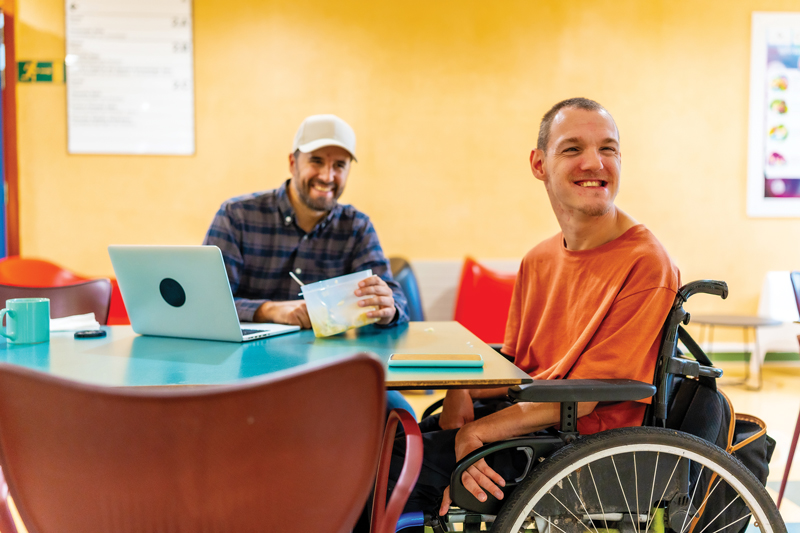
For Montanans living with disabilities, the chance to receive services close to home can make all the difference. The Olmstead v. L.C. Supreme Court decision affirmed that people with disabilities should have access to care in the most integrated, community-based settings possible. Montana is now building a plan to put those principles into practice.
Through legislation passed in 2023 and 2025, DPHHS is developing Montana’s Olmstead Plan. This plan will guide how the state expands access to community services so that, whenever possible, individuals can remain in their homes and workplaces instead of moving into institutional settings.
The plan sets measurable goals, identifies strengths and gaps in the current system, and requires regular review to ensure Montana stays aligned with Olmstead principles. It also emphasizes collaboration with families, caregivers, advocacy groups, and the Statewide Independent Living Council.
Gathering Voices Across Montana
DPHHS partnered with the Rural Institute for Inclusive Communities at the University of Montana to lead the project. Over the past year, the team hosted 23 focus groups across the state, hearing directly from people with disabilities, caregivers, and advocates. They also interviewed individuals who successfully transitioned from institutional care to more independent living. Tribal councils were engaged to ensure tribal communities had a voice in shaping the plan.
From this input, six priority goals were drafted. These goals focus on expanding access, improving quality, and strengthening supports so that Montanans with disabilities can thrive in community settings.
Public Input and Next Steps
A draft of the Olmstead Plan was released in December 2025 for a 30-day public feedback period , along with a virtual town hall. Feedback gathered during this time will be incorporated into the next version of the plan, which will be finalized in early 2026. The plan will include clear objectives, activities, and a monitoring strategy to track progress over time.
DPHHS will continue to provide updates to the legislature and the public as the plan moves forward. Collaboration with caregivers, families, and community partners remains central to ensuring the plan reflects Montana’s priorities and supports long-term implementation.
Why It Matters
Montana’s Olmstead Plan helps ensure that Montanans with disabilities can access care in settings that emphasize dignity, independence, and community connection. With greater investment in local services, the state is strengthening a system that supports people close to home.
For more info, visit the Olmstead Plan for Montana webpage.
For info about the 30-Day public feedback period, visit the UM Rural Institute's Olmstead Plan Public Feedback page.
Past Issues
Montana's Movement Toward Inclusive Care
Celebrating Care Workers Recognition Month this April
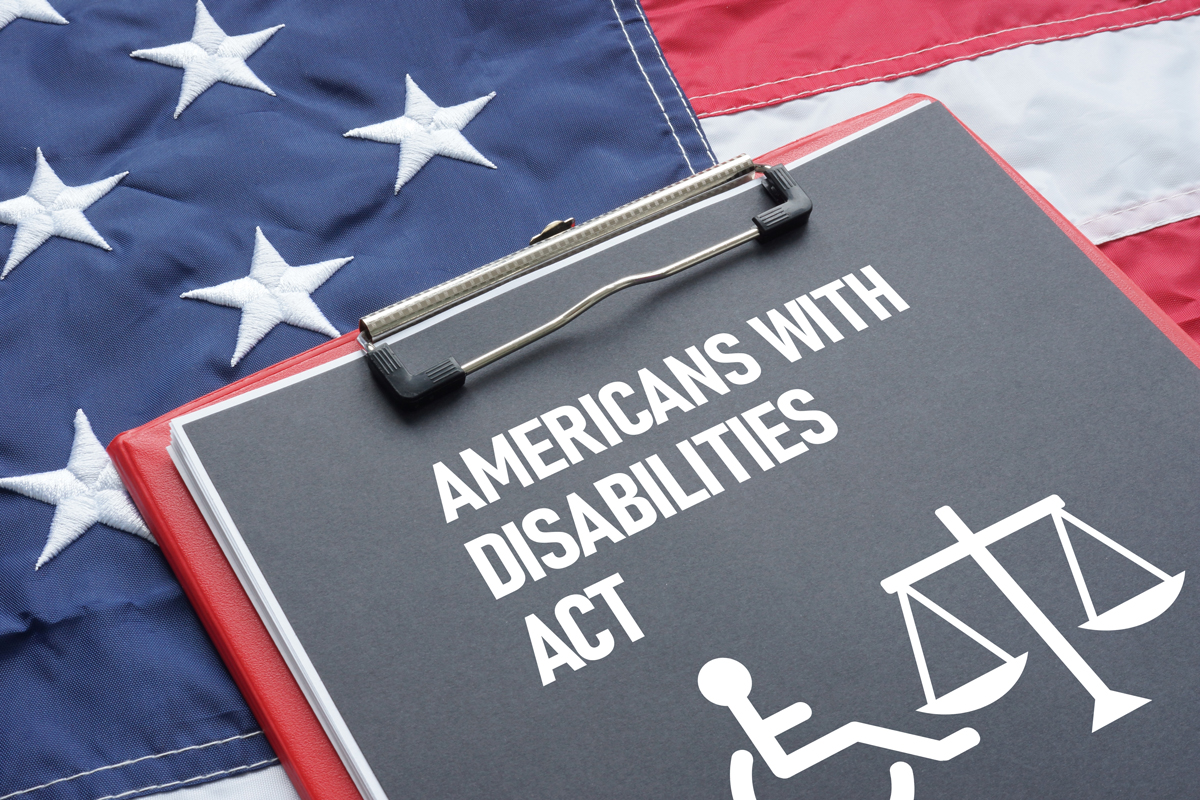
By Molly Kimmel
Director of the Rural Institute for Inclusive Communities, UM
My favorite lesser-known holiday happened on July 26, when we celebrated the Americans with Disabilities Act (ADA) becoming law. This landmark legislation, signed by George H.W. Bush in 1990, prohibits discrimination against individuals with disabilities while working to ensure people with disabilities have the same rights and opportunities as everyone else.
One of the ADA’s five mandates requires states provide community-based services and care for people with disabilities whenever possible. This was upheld in a pivotal Supreme Court decision brought forward by Lois Curtis and Elaine Wilson, two women in Georgia with developmental and mental health disabilities. Both spent significant time institutionalized before suing Tommy Olmstead, the Commissioner of the Georgia Department of Human Resources, for the right to live in their community of choice.
 In 1999, the Supreme Court ruled that, under Title II of the ADA, Lois and Elaine could not be forced to live in an institution if they could receive care in a more integrated setting in the community. Through tireless advocacy and the bravery of these two women, states are now required to implement an “Olmstead Plan” (or Curtis/Wilson plan as we call it to honor Lois and Elaine) with specific goals and objectives dedicated to effectively serving people with disabilities in their communities of choice.
In 1999, the Supreme Court ruled that, under Title II of the ADA, Lois and Elaine could not be forced to live in an institution if they could receive care in a more integrated setting in the community. Through tireless advocacy and the bravery of these two women, states are now required to implement an “Olmstead Plan” (or Curtis/Wilson plan as we call it to honor Lois and Elaine) with specific goals and objectives dedicated to effectively serving people with disabilities in their communities of choice.
Here at the Rural Institute for Inclusive Communities, Montana’s University Center of Excellence in Developmental and related Disabilities, we are superfans of the ADA. Our mission is to build access and opportunity for people with disabilities through research, evaluation, service, and training. So, we were thrilled when Department of Public Health and Human Services (DPHHS) asked us to help facilitate the development of a new and improved Curtis/Wilson Plan for Montana. Check out our progress to date on our website and look for a brand new Curtis/Wilson Plan to be disseminated in late 2025.
We are proud that this plan has been informed heavily by people with disabilities and are hopeful it brings greater access to community-integrated services to people with disabilities across the lifespan and across Montana. Let us honor Lois and Elaine by continuing to build a world where everyone has the freedom to live, work, play, age, and thrive in the communities they choose.
Celebrating A Century of Wisdom, Resilience, and Montana Spirit
Governor Gianforte, DPHHS Honor Montana's Centenarians
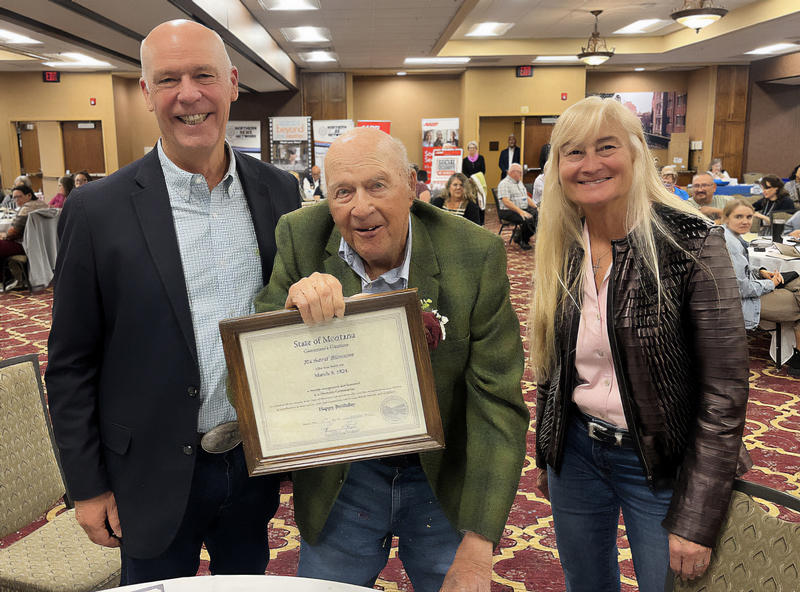
Montana centenarians were honored in Helena at the Great Northern Hotel during a special luncheon that was part of the Governor’s 56th annual Conference on Aging with the theme “Flip the Script.”
Governor Greg Gianforte attended the event to help welcome and celebrate five centenarians in attendance.
“This year, 21 Montanans have reached or surpassed the remarkable milestone of turning one hundred years young,” Governor Gianforte said. “In honoring our centenarians, we celebrate their lives while remembering the history of our great state and nation.”
DPHHS recently asked these individuals for their secret to longevity, the most amazing event in their life, a favorite quote, and various other insights into their lives. All who submitted their information this year will receive a recognition proclamation from Governor Gianforte.
The centenarians who responded to DPHHS include those who are or will turn age 100 by the end of 2025. The list includes:
- (1) 109-year-old
- (1) 105-year-old
- (1) 104-year-old
- (2) 103-year-olds
- (2) 102-year-olds
- (4) 101-year-olds
- (10) 100-year-olds
Meet A Few of Montana’s Centenarians
Virginia Toews, age 100, Billings. In 1925, Virginia was born in McClusky, ND. A farmer, who would become her husband, proposed a move from North Dakota’s brutal cold to Montana, promising she could go “anywhere in the world.” She agreed, with one condition: “Not Montana.” He convinced her to try it for six months, and though she resisted, they moved, and both fell in love with Big Sky Country.
Betty Stimac, age 100, Great Falls. Betty grew up on a farm south of Great Falls, where her childhood was filled with memories of visiting family and friends. Without a phone or car, she and her family would travel via horseback.
Richard Blossom, age 101, Helena. In 1943, Richard began his brave service in World War II. He served until 1945 as a paratrooper, sniper, and demolition expert. He recalls his first parachute jump from a C-47 with 12 other jumpers in Fort Benning, GA. Dropping from just 100 feet, the jump to the ground took only 30 seconds. After the war, Richard returned home and built a successful 40-year career as a highway construction supervisor and part-owner of Hilde Construction Company.
Dorothy Santala, age 102, Billings. Dorothy said her philosophy on longevity is “there is no secret, it just happens if you’re lucky.” And, her guiding principle is a simple yet profound truth. “Take life as it comes,” she said.
Mickael Teig, age 109, Lebo. When Mickael was younger, the Lebo Post Office was operated out of the family home. He was the eighth of 11 children, and all were born on the family farm. When he was 100, he taught himself to play the violin.
In addition to the luncheon, the conference provides valuable information about services and supports that affect the well-being of older Montanans, their loved ones, and their caregivers.
This year’s conference offered an excellent opportunity to explore the aspects of aging in Montana. Participants delved into the latest research, innovative programs, and practical strategies that help shape the experience of older adults in Montana. Breakout sessions and panel discussions explored topics such as aging in place, disaster prevention, and best practices for good mental health.
Additional conference information can be found on the Governor’s Conference on Aging website.
Montana's Movement Toward Inclusive Care
Celebrating Care Workers Recognition Month this April

By Molly Kimmel
Director of the Rural Institute for Inclusive Communities, UM
My favorite lesser-known holiday happened on July 26, when we celebrated the Americans with Disabilities Act (ADA) becoming law. This landmark legislation, signed by George H.W. Bush in 1990, prohibits discrimination against individuals with disabilities while working to ensure people with disabilities have the same rights and opportunities as everyone else.
One of the ADA’s five mandates requires states provide community-based services and care for people with disabilities whenever possible. This was upheld in a pivotal Supreme Court decision brought forward by Lois Curtis and Elaine Wilson, two women in Georgia with developmental and mental health disabilities. Both spent significant time institutionalized before suing Tommy Olmstead, the Commissioner of the Georgia Department of Human Resources, for the right to live in their community of choice.
 In 1999, the Supreme Court ruled that, under Title II of the ADA, Lois and Elaine could not be forced to live in an institution if they could receive care in a more integrated setting in the community. Through tireless advocacy and the bravery of these two women, states are now required to implement an “Olmstead Plan” (or Curtis/Wilson plan as we call it to honor Lois and Elaine) with specific goals and objectives dedicated to effectively serving people with disabilities in their communities of choice.
In 1999, the Supreme Court ruled that, under Title II of the ADA, Lois and Elaine could not be forced to live in an institution if they could receive care in a more integrated setting in the community. Through tireless advocacy and the bravery of these two women, states are now required to implement an “Olmstead Plan” (or Curtis/Wilson plan as we call it to honor Lois and Elaine) with specific goals and objectives dedicated to effectively serving people with disabilities in their communities of choice.
Here at the Rural Institute for Inclusive Communities, Montana’s University Center of Excellence in Developmental and related Disabilities, we are superfans of the ADA. Our mission is to build access and opportunity for people with disabilities through research, evaluation, service, and training. So, we were thrilled when Department of Public Health and Human Services (DPHHS) asked us to help facilitate the development of a new and improved Curtis/Wilson Plan for Montana. Check out our progress to date on our website and look for a brand new Curtis/Wilson Plan to be disseminated in late 2025.
We are proud that this plan has been informed heavily by people with disabilities and are hopeful it brings greater access to community-integrated services to people with disabilities across the lifespan and across Montana. Let us honor Lois and Elaine by continuing to build a world where everyone has the freedom to live, work, play, age, and thrive in the communities they choose.
Transitioning to New Prospects
Senior and Long-Term Care's New Digs

In the thick of a bustling legislative session, the Senior and Long-Term Care Division (SLTCD) faced an additional task: relocating their Helena office from the intersection of Last Chance Gulch and Euclid to a more compact space on Prospect Avenue (2550 Prospect Ave., Suite 500). This challenge, although marked by logistical puzzles and tight schedules, showcased the team’s creativity and resilience.
“The timing was tough,” said SLTCD administrator Lindsey Carter. “Managing the move alongside legislative responsibilities was a bit challenging.”
The transition, completed at the end of January, required significant coordination.
“There were so many details and logistics,” said Carter. Fiscal bureau chief Karen Antonick led efforts to coordinate the move. “Karen did a lot of the heavy lifting when it came to organizing and keeping everyone updated — everything from office furniture to IT equipment,” Carter added.
Antonick noted that January was a particularly challenging time for such an undertaking. She worked with the state operations project manager, Tim Dwyer, to get the job done.
“Tim did a great job of coordinating the move,” said Antonick. “Our IT division was also really helpful in providing laptops to people sharing spaces and getting us all connected.”
The new Prospect office is a smaller space, resulting in major changes for the team.
Previously, most staff members had private offices, but the new setup features shared cubicles. Carter acknowledged the challenges of shared space.
“Change is hard,” she said. “But people have adjusted really well and are being very creative with how to use the space.”
Despite sacrifices, the move brought unexpected benefits. In the old building, staff were spread out, often going an entire day without seeing each other.
The new space fosters more interaction and collaboration.
“One of the benefits is we see each other more regularly,” said Carter.
The new location also houses other state agencies, including DPHHS programs such as the Office of Inspector General (OIG), Information Technology (IT), and Disability Determination Services. According to Carter, this proximity provides opportunities for greater connection and shared resources.
The SLTCD team has demonstrated resilience and adaptability throughout the transition. “This move has shown how creative and collaborative our team can be,” said Carter.
Montana Caregivers at the Heart of It All
Celebrating Care Workers Recognition Month this April
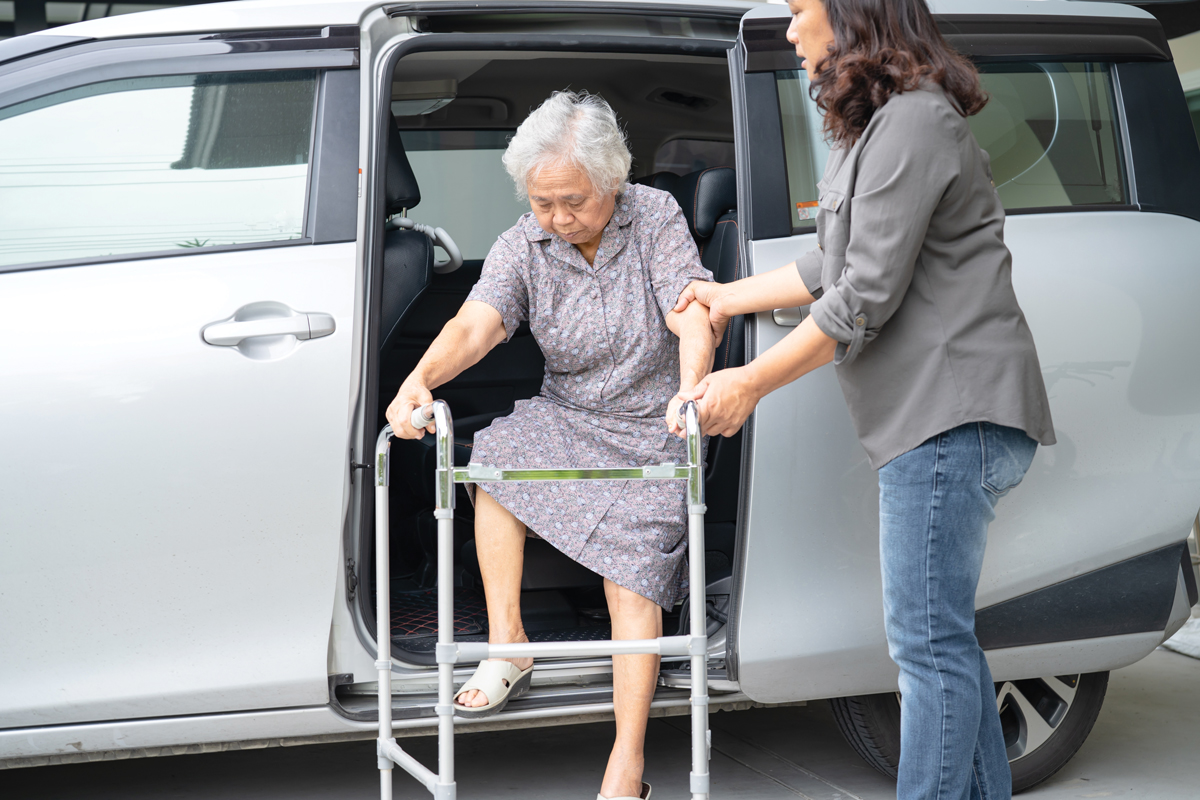
April is Care Workers Recognition Month, honoring those who provide essential care to Montana’s aging population and individuals with disabilities. From home care aides to family caregivers, their dedication ensures dignity and independence for many. Often unrecognized, care workers are vital to community well-being, and this month highlights their contributions.
SLTCD Community Services Bureau supports care workers through a variety of Medicaid programs and resources.
The Big Sky Waiver Program helps individuals remain in their homes and communities by providing services tailored to their needs. This program also supports care workers by offering tools and training to enhance their skills.
Additionally, the Community First Choice Services (CFCS) Program provides long-term care in home settings, enabling care workers to deliver person-centered services that allow elderly and disabled Montanans to maintain their independence.
The SLTCD Aging Services Bureau offers further resources to support care workers and the individuals they serve.
Aging and Disability Resource Centers provide information, referrals, and options counseling to help caregivers navigate long-term care services and supports. These centers are a valuable resource for care workers seeking guidance or assistance.
Another key program is the Lifespan Respite Program, which offers temporary relief to family caregivers by providing access to trained respite care providers. This service helps caregivers recharge while ensuring their loved ones continue to receive quality care.
As we celebrate Care Workers Recognition Month, let’s take a moment to thank the caregivers in our lives and communities. Whether through a kind gesture, a note of appreciation, or simply acknowledging their hard work, small acts can make a big difference.
To all care workers: your dedication does not go unnoticed. You are the heart of Montana’s care system, and we are deeply grateful for all that you do.
New TCARE Software
Supports Montana's Caregivers
Caregiving for a loved one can be a rewarding experience, but it often comes with significant emotional, physical, and financial challenges. Over one in five Americans serve as unpaid caregivers, with many providing more than 20 hours of care each week. This heavy load often leads to physical, emotional, and financial stress, making it challenging for caregivers to continue caring for their loved ones at home.
Recognizing these difficulties, the Aging Services Bureau of the Senior and Long-Term Care (SLTC) Division, in partnership with the Money Follows the Person (MFP) program and local Area Agencies on Aging, is introducing a game-changing tool to better support Montana’s caregivers: the TCARE software program.
An Evidence-Based Approach
TCARE is an evidence-based program designed to assess family caregivers and connect them to programs and resources that can effectively reduce their stress and burden. The software operates by addressing the root cause of caregiver burnout, known as identity discrepancy. This occurs when a caregiver’s personal identity (such as being a spouse, son, or daughter) conflicts with the new responsibilities and expectations of their caregiving role, leading to stress and burnout.
By identifying and addressing this identity conflict, TCARE provides tailored support to help caregivers manage and reconcile their roles, effectively preventing burnout.
Onboarding and Training
The first onboarding session for training TCARE specialists was held virtually with 13 participants on December 19th. Once the participants complete the additional training modules, they will be able to start accepting referrals for the program. The program includes a soft launch of the program in participating planning and service areas. These specialists will use the TCARE Family Caregiver Support Software to create individualized care plans that address issues such as burnout, stress, and depression. Continuous follow-up assessments and adjustments to care plans will ensure ongoing positive outcomes for caregivers.
The Role of TCARE Specialists
TCARE specialists play an important role in this program. They assess more than 90 burnout factors to measure a caregiver’s burnout risk and create tailored, data-driven care plans. Caregivers receive ongoing support and updates from their dedicated TCARE specialist, so they get the help they need when they need it.
Moving Forward
The TCARE software program, with its clinically proven approach, aims to prevent caregiver burnout by offering better care for caregivers. As this program rolls out in Montana, it is expected to provide crucial support to those in need and enhance the overall well-being of family caregivers.
Through initiatives like TCARE, the SLTC Aging Services bureau strives to create a network of care that not only assists caregivers but also ensures that they have the resources and support necessary to maintain their well-being.
Stay Safe on Montana’s Winter Roads
Well, the snowy season has officially arrived in Montana. Winter here is stunning, with snow-covered landscapes and crisp, clear air. However, the same beauty that makes winter enchanting can also make driving treacherous. For older adults, it’s essential to take extra precautions to stay safe on the roads. Here are some tips and advice to ensure your winter driving experience is as safe and stress-free as possible.
Prepare Your Vehicle
Before you hit the road, make sure your vehicle is ready for winter conditions:
Winter Tires: Invest in a good set of winter tires. They offer better traction on snow and ice compared to all-season tires.
Battery Check: Cold weather can affect your car’s battery. Have it tested to ensure it’s in good working condition.
Fluids: Keep your gas tank at least half full to prevent the fuel lines from freezing. Use winter-grade windshield washer fluid and make sure your antifreeze levels are adequate.
Emergency Kit: Always carry a winter emergency kit that includes a blanket, flashlight, first-aid supplies, food, water, a shovel, and traction aids like sand or kitty litter.
Plan Ahead
Knowing the road conditions and planning your route can make a big difference:
Weather Reports: Check weather forecasts before you leave. If a severe storm is expected, it’s best to delay your trip.
Route Planning: Choose main roads and highways that are more likely to be cleared and treated. Avoid back roads that might be impassable.
Daylight Driving: Try to drive during daylight hours when visibility is better, and roads are less icy.
Drive Cautiously
When you’re on the road, adjust your driving to the conditions.
Slow Down: Drive slower than usual to give yourself more time to react to any changes in road conditions.
Increase Following Distance: Keep a safe distance between you and the car in front of you to allow for longer stopping distances on slippery roads.
Brake Gently: Avoid sudden movements. Brake gently to avoid skidding. If you start to skid, steer in the direction you want to go and ease off the gas pedal.
Use Your Lights: Use your headlights to increase visibility, especially in snowy or foggy conditions.
Stay Connected
Make sure you’re able to communicate and get help if needed.
Mobile Phone: Keep your mobile phone charged and with you whenever you drive. Store important contacts, like roadside assistance, in your phone.
Let Others Know: Inform someone about your travel plans, including your route and estimated arrival time. This way, they can check on you if you don’t arrive as expected.
Stay in Your Vehicle: If you get stuck, it’s usually safer to stay in your vehicle until help arrives. Run the engine for warmth, but make sure the exhaust pipe is clear of snow.
Know Your Limits
It’s important to recognize when it’s not safe to drive.
Listen to Your Body: If you’re tired or unwell, avoid driving. Cold weather can be more physically taxing, so it’s crucial to be at your best.
Consider Alternatives: Sometimes, the best option is to avoid driving altogether. Consider public transportation, ride-sharing services, or asking friends and family for help.
Winter driving in Montana requires preparation and caution, but with these tips, older adults can navigate the winter roads more confidently and safely. Stay warm, stay safe, and enjoy the beauty of winter from behind the wheel.
Shining A Light on A Silent Epidemic
November is a month dedicated to raising awareness about Alzheimer’s disease, a devastating condition that affects millions of people worldwide. This silent epidemic, characterized by progressive memory loss, cognitive decline, and behavioral changes, has a profound impact on individuals, families, and communities.
Understanding Alzheimer’s Disease
Alzheimer’s disease is a neurodegenerative disorder that gradually destroys brain cells. As the disease progresses, individuals may experience difficulty with:
-
Memory: Forgetting recent events, names, or familiar places
-
Thinking: Struggling with problem-solving, planning, and decision-making
-
Language: Finding the right words or following conversations
-
Behavior: Experiencing personality changes, agitation, or wandering
Impact on Families
Caring for someone with Alzheimer’s disease can be emotionally and physically demanding. Family members often face challenges such as:
-
Emotional stress: Dealing with the loss of a loved one’s cognitive abilities
-
Financial strain: Managing health-care costs and potential changes in living arrangements
-
Social isolation: Limited opportunities for social activities and support
Importance of Awareness
Raising awareness about Alzheimer’s disease is crucial for several reasons.
-
Early diagnosis: Early detection can help individuals and their families plan for the future and access appropriate support services.
-
Reducing stigma: Challenging negative stereotypes and misconceptions about the disease can help create a more compassionate and understanding environment.
-
Promoting research: Increased awareness can drive funding for research aimed at finding a cure and improving treatments.
-
Encouraging support: Fostering a supportive community can empower individuals living with Alzheimer’s and their caregivers.
Action You Can Take Today
“Research shows that adopting healthy behaviors, like getting exercise and good quality sleep, may reduce the risk of cognitive decline,” said Melanie Williams, Executive Director for the Alzheimer’s Association of Montana.
“We know that the brain changes that lead to an Alzheimer’s diagnosis are happening 15 to 20 years before the disease is ever diagnosed,” Williams said. “Factors including high blood pressure, lack of physical activity, our diet, and how social we are all play a role in our risk for developing Alzheimer’s or other forms of dementia.”
24/7 Helpline: 1-800-272-3900
The Alzheimer’s Association 24/7 Helpline (1-800-272-3900) is a free service offering support for caregivers, families, the public, and people living with dementia.
You’ll connect with a live person who can provide information, local resources, crisis assistance, and emotional support.
Information is also available on the Association’s website: www.alz.org. A free online webinar explaining the 10 Warning Signs of Alzheimer’s is available there as well.
November is Alzheimer’s Awareness Month
Alzheimer’s Awareness Month is an opportunity to come together as a community and support those affected by this devastating disease.
By raising awareness, challenging stigma, and promoting research, we can work toward a future where Alzheimer’s is no longer a burden.
Worried About Winter Heating Bills?
Energy Share Can Help
Cold weather is coming, and heating bills can pile up fast. Do you know someone who is worried about how they’re going to pay those bills?
Two programs in Montana can help.The first is the Low Income Home Energy Assistance Program (LIHEAP), which helps pay a portion of your winter heating bill. The second is Energy Share, which helps Montanans at risk of losing their heat or electricity and have no other resources to pay their bills.
In Montana, it’s about neighbors helping neighbors. This might be as simple as going with a friend to help them apply for assistance.
Call Energy Share at 1-888-779-7589 to learn more. You can also find information at www.energysharemt.com.
Yes, Your Heat Can Be Turned Off In Winter
Many people think utility companies cannot shut off services during winter. However, under certain circumstances, this can happen.
From November 1 to April 1, a regulated utility cannot shut off gas, underground propane, or electric service without prior approval from the Public Service Commission (PSC). The PSC regulates companies such as Cut Bank Gas, Energy West, Montana-Dakota Utilities, and NorthWestern Energy).
The PSC will not approve a winter shutoff if a customer is unable to pay (for example, if they are receiving public assistance) or if a household member is at least 62 years old or has a disability.
Customers must inform their utility company if these circumstances apply to their household.
For more information, visit the Public Service Commission’s website at psc.mt.gov/consumers/energy/pdf/UtilityRules03012001.pdf or call 1-406-444-6199 or 1-800-646-6150.
Please note, electric cooperatives and propane vendors are not regulated by the PSC. Each has its own policies, so be sure to check with your energy provider for their specific rules.
Honoring Montana's Seniors for Older Americans Month
The Administration for Community Living (ACL) leads the nation in recognizing the invaluable contributions of older Americans. Each year, we celebrate their impact, highlight aging trends, and reaffirm our commitments to serving the older adults in our communities. The 2024 theme, Powered by Connection, introduced during Older Americans Month (OAM) in May, acknowledges the profound impact meaningful relationships and social connections have on health and well-being. This theme emphasizes how connectedness supports independence and aging in place by combating isolation, loneliness, and other issues.
Rhandi Rachlis: A Life Powered by Connection
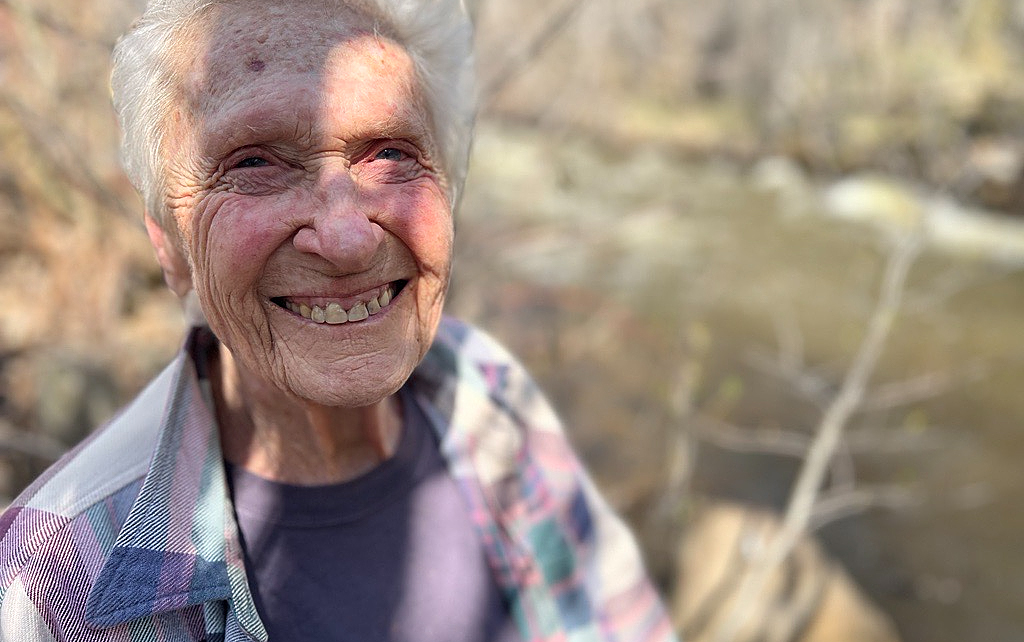
For Rhandi Rachlis of Basin, Montana, fostering meaningful connections has been a lifelong endeavor. Since moving to Montana in 1965, Rhandi has dedicated herself to her community through various roles, most notably as a volunteer at Basin Elementary School for over two decades.
“It’s so convenient because I love it,” she said. “I didn’t have kids when I was younger, and I thought I’ll just try it. They were looking for a foster grandma, and I just got sucked in. It’s a learning experience — I’m still learning.” As part of the Rocky Mountain AmeriCorps Foster Grandparents Program, Rhandi finds her volunteer work both challenging and enriching.
“I do what they tell me … or try to,” she laughed. “In the mornings, I help kindergartners and first graders with their reading and writing. I’ll help them complete their worksheets, recognize letters, and understand when they need to get up and jump around a bit.” Her afternoons often involve assisting older students with various tasks, from editing stories to accompanying them on field trips.
Supporting the Arts Community
Beyond her volunteer work at the school, Rhandi is an active supporter of the arts community. “I’ve been on lots of boards over the years, trying to help in whatever way I can,” she said. Her artistic spirit shines through in her personal projects and her involvement in local initiatives, such as the artist refuge she co-manages.
Physical and Mental Well-Being
Rhandi’s dedication extends to her physical and mental well-being. “I promised myself I would go to tai chi classes in Boulder, but I haven’t gone yet. Instead, I do my own exercises and meditations at home.” Her routine includes morning meditations, pushups, and inversions, which she believes are beneficial for her brain and body. “My pushups and my inversions have really helped my back and my knees. And I ride my bike while listening to music,” she explained.
Challenges of Aging
Despite her active lifestyle, Rhandi acknowledges the challenges of aging. “I’m sad for what I’m losing. I’m 87, and I’m not as smart or energetic as I used to be. I can’t work as hard, and I’m more isolated socially and culturally because I don’t want to drive at night anymore.” She expressed a desire to move closer to services and community events, but finding affordable housing has been difficult.
Keeping Engaged and Connected
Through all these changes, Rhandi remains committed to staying engaged and connected. She enjoys exploring different music genres on iTunes and maintains a keen interest in ethnic and folk music. “I love discovering new music. Recently, I found a Ukraine radio station that plays ethnic music from around the world.”
Rhandi Rachlis exemplifies the spirit of Older Americans Month. Her lifelong contributions to her community, her dedication to fostering connections, and her pursuit of personal growth and well-being inspire us all. As we reflect on Older Americans Month, let’s honor the remarkable seniors like Rhandi who continue to enrich our lives and communities.
Are You a Montana Veteran?
Take the Veteran Long-Term Care Survey.
Imagine a future where every Montana veteran receives the care and support they deserve, tailored to their unique needs and experiences. This vision is driving the Department of Public Health and Human Services (DPHHS) to gather insights from veterans across the state. With more than 3,300 veterans already participating, the goal is to reach at least 5,000 responses by July 15, 2024.
This survey, launched following the approval of House Bill 264 and signed by Governor Greg Gianforte in April 2023, focuses on assessing Montana’s veteran population demographics, the current state of long-term care services, and future needs. The goal is to create a robust data set that will guide the development of services tailored to veterans' needs.
Tailoring Services
"Valuable insight from survey participants will help us tailor our services more effectively, ensuring they meet the real and evolving needs of our veteran population," said Barb Smith, Senior and Long Term Care (SLTC) administrator. Smith emphasized the importance of the survey in examining needs for nursing home care, domiciliary support, Alzheimer's disease services, and various types of community and in-home care. Additionally, it will assess the condition and capacity of Montana’s veteran cemeteries.
Veterans like Blake Fuhriman, Executive Director for the Veterans Navigation Network, recognize the survey’s significance. "This survey provides an opportunity for veterans like myself to have a say in how our state treats veterans," Fuhriman said. "That is definitely worth the 15 minutes of time it took me to complete the survey."
The survey is available online at veteransurvey.mt.gov until July 15, 2024. For those who prefer a hard copy, a downloadable version is also available on the website.
Presenting the Findings
In collaboration with the Montana Veterans Affairs Division, the SLTC will compile the survey results into a detailed report for the State Administration and Veterans’ Affairs Interim Committee in September. This comprehensive assessment will inform future strategies to ensure Montana’s veterans receive the care and support they deserve.
Veterans’ voices are crucial in shaping the services that will support them and future generations. Take the survey, join a focus group, and contribute to the future of veteran care in Montana.


